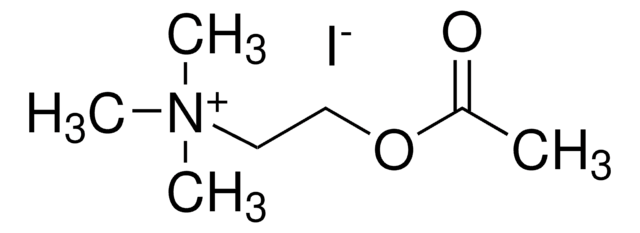C3389
Acetylcholinesterase from Electrophorus electricus (electric eel)
Type VI-S, lyophilized powder, 200-1,000 units/mg protein
Synonym(s):
AChE, Acetylcholine acetylhydrolase, Cholinesterase, Acetyl
About This Item
Recommended Products
type
Type VI-S
Quality Level
form
lyophilized powder
specific activity
200-1,000 units/mg protein
mol wt
280 kDa
composition
Protein, ≥45% biuret
solubility
20 mM Tris HCl buffer, pH 7.5: soluble 1.0 mg/mL, clear(lit.)
application(s)
diagnostic assay manufacturing
storage temp.
−20°C
Looking for similar products? Visit Product Comparison Guide
General description
Isoelectric Point: 5.5
Extinction Coefficient: E1% = 18.0 (280 nm)
Acetylcholinesterase from Electrophorus electricus is a tetramer composed of 4 equal subunits of 70 kDa each. Each subunit contains one active site. The enzyme is a glycoprotein containing hexosamines.
Application
Biochem/physiol Actions
Unit Definition
Physical form
Preparation Note
Analysis Note
Storage Class Code
11 - Combustible Solids
WGK
WGK 3
Flash Point(F)
Not applicable
Flash Point(C)
Not applicable
Personal Protective Equipment
Certificates of Analysis (COA)
Search for Certificates of Analysis (COA) by entering the products Lot/Batch Number. Lot and Batch Numbers can be found on a product’s label following the words ‘Lot’ or ‘Batch’.
Already Own This Product?
Find documentation for the products that you have recently purchased in the Document Library.
Customers Also Viewed
Our team of scientists has experience in all areas of research including Life Science, Material Science, Chemical Synthesis, Chromatography, Analytical and many others.
Contact Technical Service






